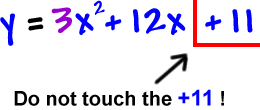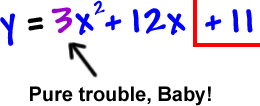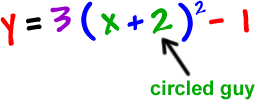Completing the square is pretty easy when the coefficient on the ![]() is one...
is one...
When it isn't, things get a little sticky.
Let's do this guy:
![]()
STEP 1: Like before...

STEP 2: Identify the trouble-maker:
Who's a problem?

We CANNOT complete the square with this 3 here -- the ![]() must be alone! So, we factor him out... of both x guys -- not the 11! You can't touch him.
must be alone! So, we factor him out... of both x guys -- not the 11! You can't touch him.
![]()
Now, we an go ahead with the rest of the process. Just don't forget about that 3 who's hanging around in the front.
STEP 3:
![]()
STEP 4:

STEP 5:

STEP 6: Remember to balance it out!
But, be careful... IT'S A TRAP!
How much weight did we really add on?
4 pounds? NO!

We really plunked on 12 pounds because the 3 distributes to the 4!
So, take 12 pounds off on the end:

STEP 7: Finish it off... Where's circled guy?

Done! He's ready to graph!
I'll let you do that!